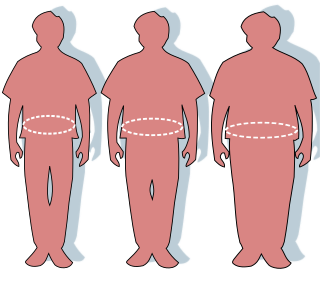Dieting is the practice of eating food in a regulated way to decrease, maintain, or increase body weight, or to prevent and treat diseases such as diabetes and obesity. As weight loss depends on calorie intake, different kinds of calorie-reduced diets, such as those emphasising particular macronutrients, have been shown to be no more effective than one another. As weight regain is common, diet success is best predicted by long-term adherence. Regardless, the outcome of a diet can vary widely depending on the individual.

Obesity is a medical condition, sometimes considered a disease, in which excess body fat has accumulated to such an extent that it can potentially have negative effects on health. People are classified as obese when their body mass index (BMI)—a person's weight divided by the square of the person's height—is over 30 kg/m2; the range 25–30 kg/m2 is defined as overweight. Some East Asian countries use lower values to calculate obesity. Obesity is a major cause of disability and is correlated with various diseases and conditions, particularly cardiovascular diseases, type 2 diabetes, obstructive sleep apnea, certain types of cancer, and osteoarthritis.

Gwen Shamblin Lara was an American author, founder of the Christian diet program The Weigh Down Workshop and founder of the Remnant Fellowship.

Weight loss, in the context of medicine, health, or physical fitness, refers to a reduction of the total body mass, by a mean loss of fluid, body fat, or lean mass. Weight loss can either occur unintentionally because of malnourishment or an underlying disease, or from a conscious effort to improve an actual or perceived overweight or obese state. "Unexplained" weight loss that is not caused by reduction in calorific intake or increase in exercise is called cachexia and may be a symptom of a serious medical condition.

A fad diet is a diet that is popular, generally only for a short time, similar to fads in fashion, without being a standard scientific dietary recommendation, and often making unreasonable claims for fast weight loss or health improvements; as such it is often considered a type of pseudoscientific diet. Fad diets are usually not supported by clinical research and their health recommendations are not peer-reviewed, thus they often make unsubstantiated statements about health and disease.

Body image is a person's thoughts, feelings and perception of the aesthetics or sexual attractiveness of their own body. The concept of body image is used in several disciplines, including neuroscience, psychology, medicine, psychiatry, psychoanalysis, philosophy, cultural and feminist studies; the media also often uses the term. Across these disciplines, there is no single consensus definition, but broadly speaking, body image consists of the ways people view themselves; their memories, experiences, assumptions, and comparisons about their appearances; and their overall attitudes towards their respective heights, shapes, and weights—all of which are shaped by prevalent social and cultural ideals.

WW International, Inc., formerly Weight Watchers International, Inc., is a global company headquartered in the U.S. that offers weight loss and maintenance, fitness, and mindset services such as the Weight Watchers comprehensive diet program. Founded in 1963 by Queens, New York City homemaker Jean Nidetch, WW's program has three options as of 2019: online via its mobile app and website, coaching online or by phone, or in-person meetings.

In nutrition, diet is the sum of food consumed by a person or other organism. The word diet often implies the use of specific intake of nutrition for health or weight-management reasons. Although humans are omnivores, each culture and each person holds some food preferences or some food taboos. This may be due to personal tastes or ethical reasons. Individual dietary choices may be more or less healthy.
Body for Life (BFL) is a 12-week nutrition and exercise program, and also an annual physique transformation competition. The program utilizes a low-fat high-protein diet. It was created by Bill Phillips, a former competitive bodybuilder and previous owner of EAS, a manufacturer of nutritional supplements. It has been popularized by a bestselling book of the same name.
Health at Every Size (HAES) is an approach to public health that seeks to downplay weight loss as a health goal, and reduce stigma towards people who are overweight or obese. Proponents argue that traditional interventions focused on weight loss, such as dieting, do not reliably produce positive health outcomes, and that health is a result of lifestyle behaviors that can be performed independently of body weight. However, many criticize the approach and argue that weight loss should sometimes be an explicit goal of healthcare interventions, because of the negative health outcomes associated with obesity.

Being overweight or fat is having more body fat than is optimally healthy. Being overweight is especially common where food supplies are plentiful and lifestyles are sedentary.
Intermittent fasting is any of various meal timing schedules that cycle between voluntary fasting and non-fasting over a given period. Methods of intermittent fasting include alternate-day fasting, periodic fasting such as the 5:2 diet, and daily time-restricted eating (TRE).
The South Beach Diet is a popular fad diet developed by Arthur Agatston and promoted in a best-selling 2003 book. It emphasizes eating food with a low glycemic index, and categorizes carbohydrates and fats as "good" or "bad". Like other fad diets, it may have elements which are generally recognized as sensible, but it promises benefits not backed by supporting evidence or sound science.

Weight management refers to behaviors, techniques, and physiological processes that contribute to a person's ability to attain and maintain a healthy weight. Most weight management techniques encompass long-term lifestyle strategies that promote healthy eating and daily physical activity. Moreover, weight management involves developing meaningful ways to track weight over time and to identify ideal body weights for different individuals.

Obesity in the Middle East and North Africa is a notable health issue. Out of the fifteen fattest nations in the world as of 2014, 5 were located in the Middle East and North Africa region.
Management of obesity can include lifestyle changes, medications, or surgery. Although many studies have sought effective interventions, there is currently no evidence-based, well-defined, and efficient intervention to prevent obesity.
Coaches are professional tutors who have expertise in their preferred area of study. Weight loss coaches, specifically, have clientele within the health and fitness industry.
Body shape refers to the many physical attributes of the human body that make up its appearance, including size and countenance. Body shape has come to imply not only sexual/reproductive ability, but wellness and fitness. In the West, slenderness is associated with happiness, success, youth, and social acceptability. Being overweight is associated with laziness. The media promote a weight-conscious standard for women more often than for men. Deviance from these norms result in social consequences. The media perpetuate this ideal in various ways, particularly glorifying and focusing on thin actors and actresses, models, and other public figures while avoiding the use or image of overweight individuals. This thin ideal represents less than 15% of the American population.

Obesity is defined as the excessive accumulation of fat and is predominantly caused when there is an energy imbalance between calorie consumption and calorie expenditure. Childhood obesity is becoming an increasing concern worldwide, and Australia alone recognizes that 1 in 4 children are either overweight or obese.

The 20th century saw multiple trends and changes in women's fitness culture.












